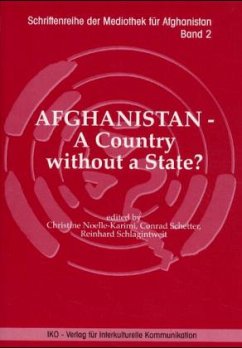The attacks on the World Trade Center and the Pentagon on 11 September 2001 have focused international attention on Afghanistan. All of a sudden, we are confronted with the question of how social and political circumstances could arise in Afghanistan that are diametrically opposed to all values and norms commonly associated with modern states and civil society. Presently, Afghanistan seems to fit the prototype of a 'failed state'. This book explores the question of whether Afghanistan is indeed 'a country without a state'.
This volume presents the findings of an international conference held in Munich in June 2000 and comprises the contributions of twenty of the most distinguished experts on Afghanistan. Each of the authors employs his/her individual scientific background to analyse the historical, political and economic mechanisms that have caused the present lack of state structures. Among the topics covered are the scope of humanitarian aid, the situation of women, the logic of a war economy, local developments, the conceptions of state current both among the Taliban and the Northern Front, and the potential of traditional institutions such as the loya jirga for creating peace.
From the Content:
Sultan A. Karimi, Siegmar-W. Breckle
Prefaces
Christine Noelle-Karimi, Conrad Schetter, Reinhard Schlagintweit
Introduction
PART I: NATIONAL IDEOLOGIES AND THEIR MANIFESTATIONS
Angela Parvanta
Afghanistan - Land of the Afghans?
Rameen Moshref
The View of the State by Aghans Abroad
Christine Noelle-Karimi
The Loya Jirga - An Effective Political Tool?
PART II: REGIONAL AND CULTURAL DEVELOPMENT
Max Klimburg
A Tense Autonomy: The Present Situation in Nuristan
Bruce Koepke
Finding a Balance between Religious Orthodoxy and the Maintenance
of Afghanistan's Performative Traditions
Rolf Bindemann
Hazara Research and Hazara Nationalism 1978-89
PART III: THE ROLE OF NGOs
Peter Schwittek
About the Schoolsystem under the Taliban Government
Heike Bill
Country without a State - Does It Really Make a difference for the Woman
PART IV: ASPECTS OF A WAR ECONOMY
Conrad Schetter
The 'Bazaar Economy' of Afghanistan: A Comprehensive Approach
Michael von der Schulenburg
Illicit Opium Production in Afghanistan
Jonothan Goodhand
From Holy War to Opium War?
PART V: POLITICAL FORMATION
Reinhard Schlagintweit
Afghanistan's Road to Failure
Ahmed Rashid
Tribe and State in Afghanistan after 1992
Miachael Pohly
Perceptions of State and Organisation of the Northern Alliance
Citha D. Maas
The Taliban and International Standards of Governance
PART VI: INTERNATIONAL DIMENSIONS
Hermann-Josef Blanke
Afghanistan - The Perspective of International Law
Amin Saikal
The Afghanistan Conflict - The Role of Outside Actors
Anwar-ul-Haq Ahady
The Failure of UN Mediation in Afghanistan
BIORAPHICAL NOTES
This volume presents the findings of an international conference held in Munich in June 2000 and comprises the contributions of twenty of the most distinguished experts on Afghanistan. Each of the authors employs his/her individual scientific background to analyse the historical, political and economic mechanisms that have caused the present lack of state structures. Among the topics covered are the scope of humanitarian aid, the situation of women, the logic of a war economy, local developments, the conceptions of state current both among the Taliban and the Northern Front, and the potential of traditional institutions such as the loya jirga for creating peace.
From the Content:
Sultan A. Karimi, Siegmar-W. Breckle
Prefaces
Christine Noelle-Karimi, Conrad Schetter, Reinhard Schlagintweit
Introduction
PART I: NATIONAL IDEOLOGIES AND THEIR MANIFESTATIONS
Angela Parvanta
Afghanistan - Land of the Afghans?
Rameen Moshref
The View of the State by Aghans Abroad
Christine Noelle-Karimi
The Loya Jirga - An Effective Political Tool?
PART II: REGIONAL AND CULTURAL DEVELOPMENT
Max Klimburg
A Tense Autonomy: The Present Situation in Nuristan
Bruce Koepke
Finding a Balance between Religious Orthodoxy and the Maintenance
of Afghanistan's Performative Traditions
Rolf Bindemann
Hazara Research and Hazara Nationalism 1978-89
PART III: THE ROLE OF NGOs
Peter Schwittek
About the Schoolsystem under the Taliban Government
Heike Bill
Country without a State - Does It Really Make a difference for the Woman
PART IV: ASPECTS OF A WAR ECONOMY
Conrad Schetter
The 'Bazaar Economy' of Afghanistan: A Comprehensive Approach
Michael von der Schulenburg
Illicit Opium Production in Afghanistan
Jonothan Goodhand
From Holy War to Opium War?
PART V: POLITICAL FORMATION
Reinhard Schlagintweit
Afghanistan's Road to Failure
Ahmed Rashid
Tribe and State in Afghanistan after 1992
Miachael Pohly
Perceptions of State and Organisation of the Northern Alliance
Citha D. Maas
The Taliban and International Standards of Governance
PART VI: INTERNATIONAL DIMENSIONS
Hermann-Josef Blanke
Afghanistan - The Perspective of International Law
Amin Saikal
The Afghanistan Conflict - The Role of Outside Actors
Anwar-ul-Haq Ahady
The Failure of UN Mediation in Afghanistan
BIORAPHICAL NOTES

